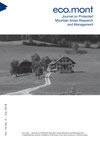Sincronización de los ciclos económicos de Guatemala y sus principales socios comerciales
IF 0.8
4区 环境科学与生态学
Q4 BIODIVERSITY CONSERVATION
Eco Mont-Journal on Protected Mountain Areas Research
Pub Date : 2023-06-30
DOI:10.36631/eco.2023.28.01
引用次数: 0
Abstract
Economists have always studied economic cycles, but it was until 1946 that these were formally defined. An economic cycle refers to the fluctuations in the economy as a result of contributions by the different actors conforming it at a determined moment. Its dynamic generates diverse characteristics such as economic booms and crises in the course of time. Among these characteristics economists have observed that in a globalized world such as today´s, the interaction and correlation amongst different countries as a result of their trade flows affects economic cycles, which has promoted the need to study their synchronization. This paper aims to determine the degree of synchronization amongst Guatemala´s most important trade partners in terms of their economic growth by applying a mathematical model. Once countries with a high degree of synchronization have been identified, we then can favour policies that increase our trade flow with them; whereas if their synchronization is low, we can search for incentives to improve it. Likewise, this focus seeks to reduce the use of value judgments by using a replicable algorithm. It concludes that by using this method, along with historical validations, we can determine an economic cycle and the degree of synchronization of the trade partners under study.危地马拉及其主要贸易伙伴的经济周期同步
本文章由计算机程序翻译,如有差异,请以英文原文为准。
求助全文
约1分钟内获得全文
求助全文
来源期刊

Eco Mont-Journal on Protected Mountain Areas Research
BIODIVERSITY CONSERVATION-ECOLOGY
CiteScore
1.20
自引率
0.00%
发文量
1
审稿时长
>12 weeks
期刊介绍:
eco.mont offers a platform specifically for scientists and practitioners working in and on protected mountain areas in Europe and overseas.Target audiences of the journal are scientists from all related disciplines, managers of protected areas and an interested public including practitioners, visitors, teachers, etc.
 求助内容:
求助内容: 应助结果提醒方式:
应助结果提醒方式:


